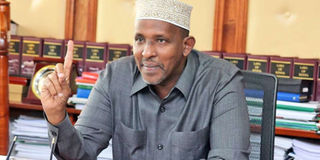Role of BBI taskforce has been hijacked, says Aden Duale

National Assembly Majority Leader Aden Duale. PHOTO| DENNIS ONSONGO | NATION MEDIA GROUP
What you need to know:
The pastoralists parliamentary group argued that it was wrong to say that resources follow people with no reference to the land mass.
- The team also opposed calls for a regional government.
The team wants Kenya to adopt a pure parliamentary system of governance.
National Assembly Majority Leader Aden Duale has expressed concern over what he said was the hijacking of the Building Bridges Initiative (BBI) taskforce role by people he said did not mean well for the process.
Mr Duale said he skipped the Garissa BBI popularisation rally on Sunday because of the way it was being run.
BBI REPORT
“If we do not stop what is happening in BBI rallies across the country, by mid-March, this country will be divided down the middle,” said Mr Duale who had led the pastoralists’ parliamentary group to present its recommendations to the BBI team.
Mr Duale said the BBI rallies, which have been led by Orange Democratic Movement leader Raila Odinga, were not the best forum to take Kenyans views on the report released in November last year.
“This is the only team gazetted in law to take the BBI recommendations. Now, how do you ask me to take my views to a political rally?" asked Mr Duale.
He said the rallies were now being used for the 2022 presidential campaigns.
"Every weekend, we see these very well organised rallies whose funding we do not know. As Majority Leader, I can tell you, there is no budget line for those rallies in the current budget as far as I am concerned,” he said.
He asked the Garissa Senator Yusuf Haji-led team to hold a meeting with President Uhuru Kenyatta, Mr Odinga, Deputy President William Ruto, and top leaders, to iron out the way to go about the process.
DIVISION
He warned that the process might lead to division if not checked. In their recommendations, group has rejected a proposal by the BBI taskforce of 'one man, one vote, one shilling' on resource allocation and for purposes of the General Election.
Led by Mr Duale, the team said that the proposal will discriminate against regions they represent.
They argued that it was wrong to say that resources follow people with no reference to the land mass.
"While we agree that each citizen's vote is important, we are concerned that as a people that occupy 80 per cent of the land mass in Kenya on how this principle will be applied," Mr Duale told the BBI team during its ongoing validation hearings at the Kenyatta International Convention Centre (KICC).
LAND MASS
In its place, the leaders said the proposal should be replaced with one that will consider the land mass, using the 'one square kilometre, one shilling' model.
"Look at for example North Horr constituency at 32,000 square kilometres represented by one member of Parliament compared to a constituency in Nairobi that is barely ten square kilometres, where one can just hop on a motorcycle and have gone round the whole constituency in one day when the person in North Horr needs almost two months for a similar exercise,” Mr Duale said.
The team also opposed calls for a regional government. They suggested that no county, ward, or constituency should be merged in the proposed boundary review.
PARLIAMENTAY SYSTEM
The team wants Kenya to adopt a pure parliamentary system of governance.
“The political competition should be at the constituency level. Kenyans do not fight over any other elections except presidential poll, which becomes ethnic,” the team said.
They also called for the implementation of various reports including the Truth, Justice and Reconciliation Commission report, the Ndung'u Land Report, and the Krieger Reports.





